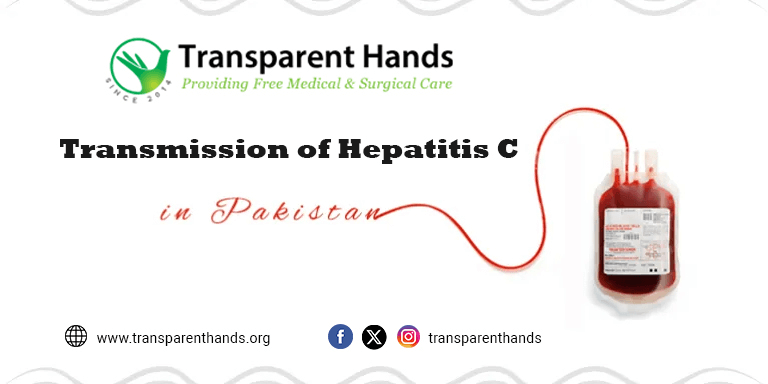Transmission of Hepatitis C in Pakistan

Pakistan is currently facing an alarmingly high prevalence of Hepatitis C. This virus not only affects the liver but can also be deadly if left untreated. Besides providing treatments to Hepatitis C patients, we also need to take steps to prevent it from spreading across the country. This article will help you learn more about the transmission of Hepatitis C and the ways to eliminate it.
Contribute today to our special campaign for Hepatitis C
What is Hepatitis C?
Hepatitis C is a communicable bloodborne disease that affects the liver. The transmission of Hepatitis C can take place in multiple ways. If we don’t provide timely treatments, the Hepatitis C virus (HCV) can cause liver conditions like cancer and scars.
Prevalence of Hepatitis C in Pakistan
There were around 10 million reported cases of Hepatitis C in Pakistan, making it the country with the highest prevalence of this infectious disease in the world. Like other countries that are members of the United Nations, Pakistan also aims to achieve the Sustainable Development Goal (SDG) related to Hepatitis (SDG 3.3). SDG 3.3 aims to combat hepatitis by 2030. The World Health Organization (WHO) has identified many areas of Pakistan like Sanghar, Sindh, where the number of Hepatitis C patients is high.
How is Hepatitis C Transmitted in Pakistan?
Hepatitis C virus (HCV) is a bloodborne disease. In Pakistan, the transmission of Hepatitis C occurs in the following ways:
- Unscreened blood transfusions: If the blood is not screened for Hepatitis C before it is transfused, the recipient can get infected.
- Reusing syringes: Used syringes carry traces of blood, which can spread Hepatitis C if the person is infected. To tackle this way of transmission of Hepatitis C, many areas of Pakistan are focusing on making sure most of the syringes in the healthcare sector are disabled automatically after being used.
- Using surgical instruments without sterilization: If the surgical instruments are not sterilized properly after being used, they can transmit Hepatitis C. It’s important to make sure the instruments are properly sterilized when undergoing surgical and dental procedures.
- Reusing razors: When barbers reuse razors, they can spread Hepatitis C from one customer to another.
Transparent Hands’ Role in Eliminating Hepatitis C
The organization is focusing on providing Hepatitis C treatments in many areas identified by the World Health Organization (WHO). The lack of awareness about the transmission of Hepatitis C also contributes to the prevalence of this communicable disease. Transparent Hands not only provides free Hepatitis B & C screenings at medical camps around the country but also organizes preventive healthcare sessions for the attendees. The deserving Hepatitis C patients who are identified at these medical camps are registered for further treatments. Transparent Hands has partnered with leading healthcare providers to ensure that Hepatitis C patients receive effective treatments.
Join hands with us to eliminate Hepatitis C and other communicable diseases in Pakistan. Contribute today to our special campaign for Hepatitis C.











Leave Your Comments